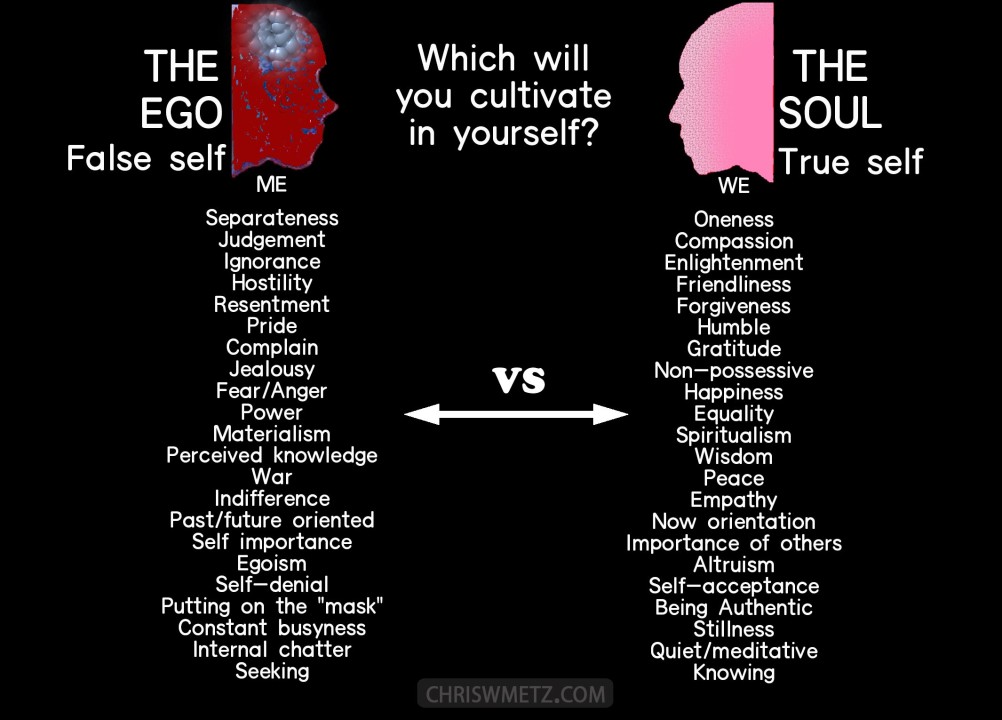
Ego vs. Soul: Navigating the Inner Conflict for Self-Discovery and Growth.
Title: Ego vs. Soul: Navigating the Inner Conflict for Self-Discovery and Growth
Introduction:
The human experience encompasses a complex interplay between the ego and the soul. The ego represents the self-centered, protective, and often fear-driven aspects of our psyche, while the soul embodies our higher self, inner wisdom, and connection to something greater than ourselves. Understanding the dynamics between the ego and the soul is essential for personal growth, self-discovery, and living a fulfilling life. In this article, we will explore the nature of the ego and the soul, their roles in shaping our experiences, and strategies for harmonizing their conflicting influences.
I. The Nature of the Ego:
- Definition and Characteristics:
- The ego, rooted in our personality, is the self-identity we construct based on our experiences, beliefs, and external validation. It seeks to protect our self-image, maintain control, and defend against threats. The ego operates from a place of separateness, driven by fear, attachment, and the need for validation.
- Illusions and Limitations:
- The ego often leads us to identify with our roles, achievements, possessions, and external appearances, creating an illusion of identity disconnected from our authentic self. It perpetuates desires for power, status, and material gains, which can lead to dissatisfaction, competition, and a perpetual sense of lack.
II. The Essence of the Soul:
- Definition and Characteristics:
- The soul represents the eternal and transcendent aspect of our being. It is connected to universal consciousness and embodies qualities such as love, compassion, wisdom, and inner peace. The soul seeks growth, purpose, and connection with others and the world.
- Authenticity and Wholeness:
- The soul is aligned with our true essence, untouched by external influences. It encourages authenticity, urging us to embrace our uniqueness and express our deepest values, passions, and gifts. When we live in alignment with our soul, we experience a sense of wholeness and fulfillment.
III. The Conflict between Ego and Soul:
- Identification and Attachment:
- The ego's attachment to external validations and desires often leads to conflict with the soul. The ego seeks approval, control, and immediate gratification, while the soul calls for inner exploration, selflessness, and a deeper sense of purpose.
- Fear and Resistance:
- The ego resists change, fearing the loss of control or the need to confront uncomfortable truths. It tends to resist the soul's call for growth and transformation, perpetuating patterns of self-sabotage, denial, and resistance to personal evolution.
IV. Strategies for Integration and Growth:
- Self-Awareness and Mindfulness:
- Developing self-awareness allows us to observe the ego's patterns, triggers, and limiting beliefs. Mindfulness practices cultivate present-moment awareness, enabling us to disengage from ego-driven reactions and align with our soul's guidance.
- Inner Dialogue and Reflection:
- Engaging in introspection and self-reflection helps us discern between ego-driven desires and the soul's authentic longings. By questioning our motivations, beliefs, and fears, we can gain clarity about our true desires and align our actions with our soul's purpose.
- Cultivating Compassion and Love:
- Practicing self-compassion and extending it to others bridges the gap between the ego and the soul. Compassion fosters empathy, connection, and a deeper understanding of our shared humanity, allowing the soul's qualities to emerge more fully.
- Letting Go and Surrender:
- Releasing attachment to outcomes, surrendering control, and embracing uncertainty supports the soul's guidance. Letting go of ego-driven expectations opens up space for new possibilities and allows us to trust the natural flow of life.
V. Integrating Spirituality and Mind-Body Connection:
· Exploring spiritual practices, such as meditation, prayer, or connecting with nature, enhances the integration of the ego and the soul. These practices foster a sense of inner peace, expand our awareness, and deepen our connection to something greater than ourselves.
- Cultivating Gratitude:
· Practicing gratitude shifts our focus from ego-driven desires to recognizing and appreciating the blessings in our lives. Gratitude cultivates a positive mindset, enhances contentment, and opens our hearts to the soul's guidance.
Conclusion:
The interplay between the ego and the soul is an inherent part of the human experience. Understanding the nature of the ego and the essence of the soul allows us to navigate the inner conflict with greater awareness and intentionality.
By nurturing our connection with the soul, we can transcend the limitations of the ego, embrace authenticity, and live a life aligned with our true purpose and inner wisdom. Through self-discovery, self-compassion, and mindful practices, we embark on a transformative journey toward harmony, personal growth, and a deeper connection to ourselves and the world around us.
I hope you enjoyed my 1%.
Very nice read ... thank you for sharing
Digital Content Editor | Creative Production & Social Media for the Entertainment Industry
4moThis was such an amazing, well written, comprehensive read. Thank you for your thoughts 💘